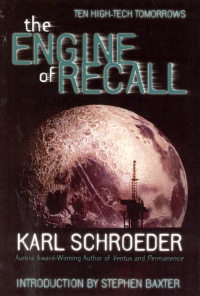| ________________
CM . . .
. Volume XII Number 7 . . . .November 25, 2005
excerpt:
Can a Manitoban Mennonite write hard science fiction? While other Mennonites seem to have a monopoly on humour these days, Karl Schroeder proves that he can craft a sci-fi story as well as the next Anabaptist. Schroeder’s collection of 10 short stories, The Engine of Recall, is advertised as containing “ten high-tech tomorrows.” The technological devices that Schroeder uses in his stories range from telepresence, remote piloted land vehicles, robot space prospectors, space mines, masers, symbiotic spacesuits, hypersonic scramjets and nuclear ramjets to virtual reality, holographic memories, software ghosts, asocial aliens, and psychically gifted, unexpectedly dangerous displaced persons. The stories span most of Schroeder’s twenty-year career. The Engine of Recall even includes a new story, “Alexander’s Road,” to satisfy devout fans who already have the rest of the stories in magazine form. The oldest story dates from 1991, about when I left the comforting world of science fiction for a world somehow less comforting. Mea culpa, I have to confess that I am a lapsed sci-fi reader. One of my former professors teaches that genre fiction must be reviewed solely on the basis of the archetypal standards of the genre. In Schroeder’s first story, “Hopscotch,” he never reveals any details about the physical appearance of the two main characters, Linda and Alan. Are they blond or brunette, short or tall, black or white? We’ll never know. In most sci-fi stories, physical characteristics are only important if they directly affect the plot, such as a physical disability. It is the plot, and the technology that drives the plot, that is most important in sci-fi. When I put on a piece of virtual headgear, my genre compensators, I can see that Schroeder is a better than average sci-fi writer. His publisher, Robert J. Sawyer Books, describes the book as “tales of ordinary people in astonishing circumstances.” This is indeed true. Schroeder’s heroes are unassuming, matter-of-fact people who deal with the life threatening challenges that face them as best they can. In Schroeder’s vision of the future, we will still have friends, lovers, children and spouses. We will deal with despots, technology that screws up, and ecological disaster, just as now. The stories are lean and crisply written. Philosophical issues, such as the nature of intelligence and humanity, are looked at with a sympathetic and thoughtful eye. Bad science fiction always offers the optimism of a technological fix to every problem. Schroeder’s heroes and heroines have genuine half tones. While perhaps not described externally, internally they are depicted as being much more than black and white stick figures. His characters often manage to survive by jettisoning technology itself, abandoning the props that they have come to rely upon. By embracing their humanity, they defeat the problem that threatens to kill them. As they escape their dangerous predicaments, they gain greater self knowledge. Schroeder’s somewhat dystopic stories show that he can ably handle plot, atmosphere and the many conventions of the short story. Crossing over into the world of infinite shades of grey, dropping his old camera, is well within his reach. Only 43 years old, Schroeder’s best work may be ahead of him. For now, teen-age readers will enjoy reading these stories. I have to admit that I liked reading them as well. Recommended. Dave Watson, of Winnipeg, MB, is a sometime educator, sometime environmentalist and sometimes curmudgeon.
To comment
on this title or this review, send mail to cm@umanitoba.ca.
Copyright © the Manitoba Library Association. Reproduction for personal
use is permitted only if this copyright notice is maintained. Any
other reproduction is prohibited without permission.
NEXT REVIEW |
TABLE OF CONTENTS FOR THIS ISSUE
- November 25, 2005.
AUTHORS |
TITLES |
MEDIA REVIEWS |
PROFILES |
BACK ISSUES |
SEARCH |
CMARCHIVE |
HOME |
